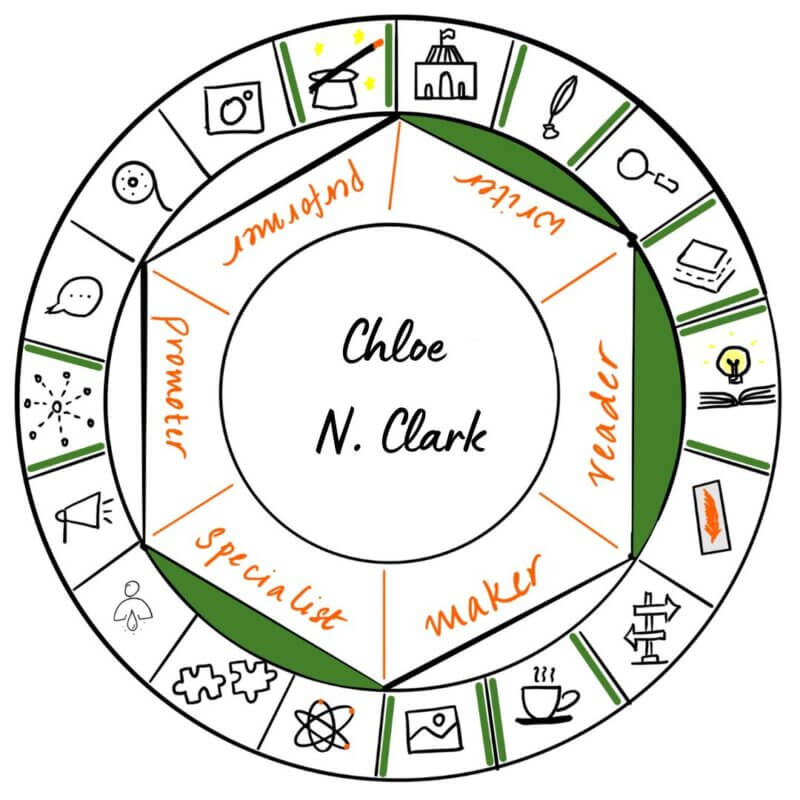Welcome, friend! Once in a while when I am scrolling on the Internet, I come across people and things that are interesting. Chloe N. Clark is the author of Collective Gravities, the forthcoming Every Galaxy Is a Circle, and more. She is Co-EIC of Cotton Xenomorph. She has taught a number of writing classes over the years and I reached out get to know her experiences.

Welcome Chloe! I came across your Monster Theory and Creating Contemporary Monsters class on BlueSky and learned that you offer online writing workshops! How long have you been doing this?
I’ve been teaching creative writing since 2013 and moved to doing online classes in 2020. I love how much offering asynchronous online courses opens up the courses to people who otherwise wouldn’t have the opportunity to take this type of class.
Tell me about your first writing workshop that you taught.
In 2013, I co-taught a class for undergrads on multi-genre writing while I was in grad school. It was a great chance to learn what worked in a workshop, without being beholden to one genre or style.
What are the perks and challenges of online writing workshops? How do you get around the challenges?
The perks are the diversity of students, as well as I think there’s something powerful to being in charge of your own learning. Online classes allow you to absorb material in the way that works best for you and pushes you to interact/engage with the material in a way that you might not otherwise.
Challenges are that engagement can feel less vital than it might in an in-person classroom. But, I try to avoid this by encouraging open dialogue and using Slack.
What are some of your favorite workshops that you have offered in the past?
I will often co-run classes on space and writing with my partner (who works in the space industry). It’s a lot of fun to have someone to bat ideas around with.
I want to know more about the Monster Theory and Creating Contemporary Monsters. How did the idea for it first come to you?
In grad school, I became deeply interested in the Monster Theory area of scholarship. It perfectly combined my interest in folklore with my passion for social justice. Monster Theory examines the way different cultures use the idea of the monster or “other” to systemically harm groups that are outside cultural/societal norms. It’s an area of study that allows us to see the way that harmful rhetoric is used in a very direct way.
This is a revised version of the original. How has it changed?
Every time I run a class I take stock of what went well and what can be improved, so all of my classes tend to evolve. This one has gone through many iterations—including the addition of mini PowerPoint/audio lectures.
What advice would you give to someone who is interested in creating their own workshops?
Start small and figure out what style you like, how many students you can handle, etc. Learning pacing can be hard. One tip is to poll your students anonymously on the last day about what went well or didn’t—so you have some honest feedback to work with!
Which was your first writing workshop that you took?
Many, many, many, years ago I took an intro to creative writing class for my very first degree. It was multigenre and very workshop, rather than critical lens, aimed. It really opened my eyes to how a workshop worked and made me fall in love with them!
What advice would you give to someone who is interested in taking an online workshop?
Remember that you’ll get out of the class what you put in. If you’re nervous about submitting writing on a deadline, maybe take a class that is generative but doesn’t involve feedback for your first one.
What do you enjoy most about offering online writing workshops?
Reading student work. Always and forever. It’s a great joy and a greater privilege.
Apart from teaching, you are an author and co-editor-in-chief. How do these roles complement each other?
I think editing helps me be a far stronger writer, as does teaching writing. Because I’m constantly being forced to really think about how language is being used, how something is working on these fundamental levels.
Is there anything else you would like to add?
If you’ve never taken a writing class, but you think you might want to–even if you’ve never written, try one. They can truly be life changing.
Thank you so much for taking the time to talk to me. 🙂

Thank you for reading this post! Do you have any questions for Chloe? Connect with her on social media: @PintsNCupcakes on Twitter and @PintsNCupcakes.bsky.social on Bluesky. Learn about her on her website and her editing work on Cotton Xenomorph.
Be sure to check out Rose Atkinson-Carter’s article on the benefits of taking a writing class.

Be First to Comment